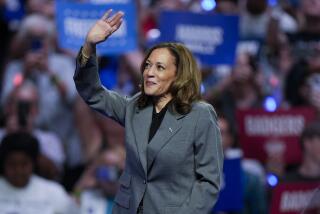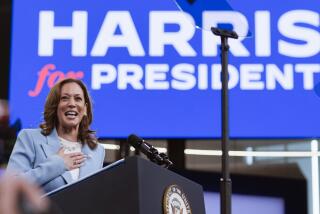MoveOn Steps Into DNC Chair Contest
WASHINGTON — MoveOn.org, the online liberal advocacy group, threw its weight into the race for the Democratic National Committee chairmanship by announcing a plan Tuesday for state-by-state endorsements from its nearly 3 million members.
The move is expected to help chairman candidate Howard Dean, who finished first in a 2003 straw poll of MoveOn members during his unsuccessful bid for the Democratic presidential nomination.
The plan also reflects MoveOn’s determination to institutionalize its influence within the Democratic Party. Founded to protest President Clinton’s impeachment in 1998, the group has become one of the party’s most influential liberal voices, and most effective fundraisers, on a wide range of issues.
Dean is generally considered the front-runner in a DNC race that also includes former Reps. Martin Frost of Texas and Tim Roemer of Indiana, former Denver Mayor Wellington Webb, party operative Donnie Fowler, former Ohio party Chairman David Leland, and Simon Rosenberg, president of the centrist New Democrat Network.
On Tuesday, the former Vermont governor won the support of several African American members of the DNC -- Yvonne Atkinson Gates, who heads the committee’s black caucus; Rep. Jesse Jackson Jr. of Illinois; and Minyon Moore, a former Clinton White House aide.
But Dean also faces behind-the-scenes resistance from many party leaders who believe he will project too liberal an image, particularly after an election in which the GOP consolidated its strength in the South and the Mountain West.
Another key party group is also planning to jump into the DNC race with a high-profile endorsement. A group of about two-thirds of the state party chairs plans to endorse a single candidate Sunday after meeting with the contenders in New York City, said California Democratic Chairman Art Torres.
MoveOn officials say their intervention is not designed to boost any candidate. But Dean’s rivals believe the group is hoping to push him over the top in the race, which will be decided by the committee’s 447 members in Washington on Feb. 12.
“Absolutely, it is designed to help Dean,” said a senior aide to one of his rivals.
Under the plan announced Tuesday, MoveOn’s political action committee will ask its members to suggest questions for the candidates in the DNC race. Within a few days, it expects to forward the most commonly requested questions to the candidates.
After posting the answers on its website, the group will ask its members in each state to vote on their preference for the party chairperson. Then it will send the results to the DNC members.
“We want to really keep a focus on who our members prefer ... and create a connection between them and the state party members who they ought to have a relationship with,” said Eli Pariser, executive director of the MoveOn PAC. “Part of this, in the broad sense, is reintroducing the party and its base to each other.”
During the 2004 election, MoveOn surged to the forefront of liberal groups by raising more than $55 million, mostly through its PAC and a so-called 527 organization, named for the section of the tax code that governs it, that collected unlimited contributions.
It also demonstrated an enormous grass-roots reach, organizing thousands of house parties around events such as Michael Moore’s movie “Fahrenheit 9/11” and recruiting large numbers of volunteers for targeted get-out-the-vote efforts.
In another round of house parties with members after the campaign, the group has decided to focus on maintaining its local network and field organizing staff with the aim of regaining control of the House of Representatives in the 2006 election.
“We see the big opportunity to do a [Newt] Gingrich-style revolution for progressives in 2006,” Pariser said.
Since the election, MoveOn has come under fire from some Democratic centrists, who accuse it of pushing the party too far to the left, especially on foreign policy and national security issues.
But several Democratic leaders contacted Tuesday welcomed its involvement in the DNC race as an opportunity to strengthen links between the party structure and local activists.
“I think it’s healthy for the process and for whoever becomes chairman,” Torres said.
More to Read
Get the L.A. Times Politics newsletter
Deeply reported insights into legislation, politics and policy from Sacramento, Washington and beyond. In your inbox three times per week.
You may occasionally receive promotional content from the Los Angeles Times.










